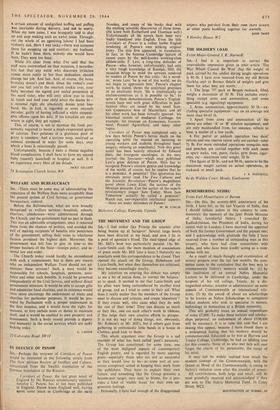WELFARE AND BUREAUCRACY SIR,—There must be some way of administering
the apparatus of the Welfare State more acceptably than the present system of Civil Service, or government bureaucracy, control.
Before the Reformation, what are now broadly recognised as welfare services—hospitals, schools, charities, almshouses—were administered through the Church, and the government had no part in them. This was an admirable arrangement, since it removed them from the chances of politics, and avoided the evil of making recipients-of benefits into pensioners of the government, selling their votes to whichever faction promised the highest dole. Moreover, the government was left free to give its time to the Proper business of the State—foreign policy, and in- ternal law and order.
The Church today could hardly be encumbered With such a commitment, but is there any reason Why an independent Welfare Trust should not ad- minister these services? Such a trust would be responsible for schools, hospitals, pensions, assis- tance and other such benefits. It would be governed independently of the Civil Service, and without direct
government intrusion. It would be able to accept gifts and administer local charities, and its existence would once more encourage the endowment of trusts and charities for particular purposes. It would be pro- vided by Parliament with a proper endowment in the first instance, and it would have the right, for instance, to levy certain taxes or duties to maintain itself, and it would be enabled to own property and investments. Such a body would provide a dignity and humanity in the social services which are sadly lacking today.
22 Culverden Road, SW I2 C. CARTER


































 Previous page
Previous page